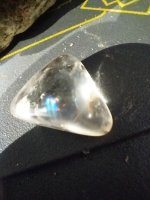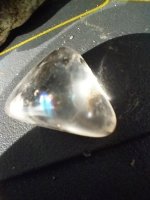N.J.THer
Silver Member
- Nov 16, 2006
- 3,282
- 238
- 🥇 Banner finds
- 1
- Detector(s) used
- Whites DFX w/ Sunray DX-1 probe and Minelab Excalibur 1000, Whites TRX Pinpointer
- Primary Interest:
- Metal Detecting
I just had a friend build me an electrolysis setup. I know it is easy but I have this fear of tinkering with electronics so I never got around to building one. Last night was my first experiments with the system and I really like it. I cleaned up a large cent that had almost no details visible and it turned out to be a 1817 LC then I cleaned up a 1965 2 Center which really made the details pop.
I do have a few questions:
1. Are there any types of coins I should not use the system on? Coppers seem to work really well but I have not tried it on silver or nickels.
2. Should I clean the coin in one sitting or does anyone do electrolysis in combination with the peroxide method?
3. I've been using just salt in the water but I've read that lemon juice may help. Is there any reason why I would not want to add lemon juice?
4. I've seen people clean up cannon balls and the such. My setup has alligator clips. How do you attach the system so something that is round? Is there a special setup/adjustment that I need to make?
5. Is there anytime in general that I should not use this system on a find?
Feel free to add any additional comments especially if I'm missing something major.
Thanks in advance for your help.
NJ
I do have a few questions:
1. Are there any types of coins I should not use the system on? Coppers seem to work really well but I have not tried it on silver or nickels.
2. Should I clean the coin in one sitting or does anyone do electrolysis in combination with the peroxide method?
3. I've been using just salt in the water but I've read that lemon juice may help. Is there any reason why I would not want to add lemon juice?
4. I've seen people clean up cannon balls and the such. My setup has alligator clips. How do you attach the system so something that is round? Is there a special setup/adjustment that I need to make?
5. Is there anytime in general that I should not use this system on a find?
Feel free to add any additional comments especially if I'm missing something major.
Thanks in advance for your help.
NJ





